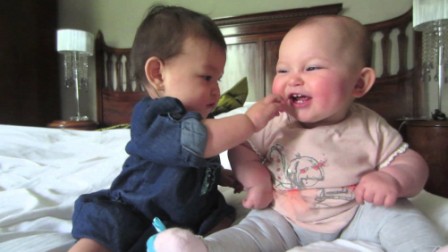Why infants prefer listening to other babies?
Six-month-old infants appear to be much more interested in listening to other babies than they are in listening to adults, a new study has found.
rnrn
Six-month-old infants appear to be much more interested in listening to other babies than they are in listening to adults, a new study has found.
rnResearchers believe that babies’ attraction to infant speech sounds may help to kick start and support the crucial processes involved in learning how to talk.
rnThe researchers at McGill University and the Universite du Quebec a Montreal (UQAM) discovered this preference on the part of young infants by doing a series of experiments where they played a repeating vowel sound that mimicked either those made by an adult woman or those made by a baby.
rnThe sounds were created using a special synthesis tool. By measuring how long each sound held the infants’ attention, the researchers discovered that the babies had a clear preference for the sounds that mimicked the infant.
rnOn average, the infants listened to the infant vowels almost 40 per cent longer than the adult woman vowels.
rnThis is not a preference for a familiar sound because the babies who took part in the experiment were not yet babbling themselves, so the infant-like vowel sounds that they heard were not yet part of their everyday listening experience, researchers said.
rnSome babies met the adult vowel sounds with fairly neutral, passive faces. But when they heard infant-like sounds, they would smile or move their mouths as they listened, or do both.
rnThey seemed to recognise that this was a sound that they could try to make themselves, even though they probably had never heard anything like it before, researchers said.
rn“Perhaps, when we use a high, infant-like voice pitch to speak to our babies, we are actually preparing them to perceive their own voice,” said Professor Linda Polka, of McGill’s School of Communication Disorders, and the senior author on the study.
rn“As adults, we use language to communicate. But when a young infant starts to make speech sounds, it often has more to do with exploring than with communicating in fact babies typically vocalise when they are alone, without any interaction or eye contact with others,” said Polka.
rn“That’s because to learn how to speak babies need to spend lots of time moving their mouths and vocal cords to understand the kind of sounds they can make themselves. They need, quite literally, to ‘find their own voice’,” Polka said.
Related Posts

